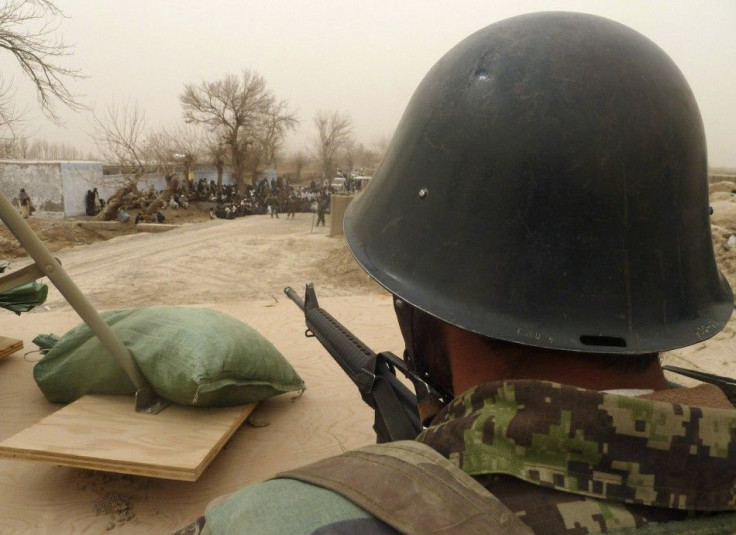US Fears Reprisals after Afghan Shooting Rampage

(Reuters) - US officials have warned of possible reprisal attacks after 16 Afghan villagers, mostly children and women, were killed in a likely rogue shooting by a US soldier that weakens the West's tenuous grip on a decade-old war.
Washington has rushed to distance the shootings, blamed on a lone US soldier, from the efforts of the 90,000-strong US force in Afghanistan, but the rampage in southern Kandahar province is certain to inflame anti-Western anger once again.
It comes less than three weeks after US troops inadvertently burned copies of the Koran, the Muslim holy book, at the main Nato base in Afghanistan, sparking widespread protests in which 30 people were killed.
The US Embassy in Kabul alerts US citizens in Afghanistan that as a result of a tragic shooting incident in Kandahar province involving a US service member, there is a risk of anti-American feelings and protests in coming days, especially in the eastern and southern provinces, the embassy said in an emergency statement on its website.
Kandahar is the birthplace of the Taliban, toppled by US-backed forces in late 2001. Southern and eastern provinces have seen some of the fiercest fighting of the war, increasingly unpopular among Americans and their European allies.
Early on Monday, the embassy said on its Twitter feed restrictions had been placed on the movements of all embassy personnel in the south.
A sharp increase in attacks on US troops by Afghan forces followed the Koran burning. Sunday's incident in Kandahar was one of the worst of its kind, witnesses describing it as a night-time massacre that killed nine children and three women.
Villagers in three houses were attacked and many civilians were wounded, a spokesman for the Nato-led International Security Assistance Force (ISAF) said.
Deeply saddened, President Barack Obama called Afghan counterpart Hamid Karzai, promising to establish the facts quickly and to hold fully accountable anyone responsible.
This incident is tragic and shocking and does not represent the exceptional character of our military and the respect that the United States has for the people of Afghanistan, Obama said in a statement.
However, such incidents fuel anti-Western sentiment among Afghans and are quickly exploited by the insurgents. The Afghan Taliban said it would take revenge.
WIDESPREAD ANGER
The burning of copies of Koran at Bagram air base touched off widespread anger among Afghan officials, security forces and civilians alike. It also shows the challenges that remain as foreign forces prepare to withdraw combat troops and hand security responsibility to Afghans by the end of 2014.
Sunday's attack may also harden a growing consensus in Washington about what can be accomplished in Afghanistan even after a troop surge meant to turn the war around.
The bill for the war has already exceeded $500 billion and more than 1,900 US troops have been killed, with the total number of foreign troops killed approaching 3,000.
These killings only serve to reinforce the mindset that the whole war is broken and that there's little we can do about it beyond trying to cut our losses and leave, said Joshua Foust, a security expert with the American Security Project.
Karzai, whose relationship with his Western backers is fraught at the best of times, seethed. Civilian casualties caused by US and other Western forces have long been a major cause of friction between Washington and Kabul.
He condemned the rampage as intentional murders and demanded an explanation. Karzai's office released a statement quoting a villager as saying American soldiers woke my family up and shot them in the face.
There were conflicting accounts of how many US soldiers were involved, with witness accounts saying there were several.
Officials from the U.S. Embassy, ISAF and from Washington said it appeared there was only one. An ISAF spokesman said the lone U.S. soldier walked back to the base and turned himself in to US forces this morning, adding there had been no military operations in the area.
The soldier in custody was described by one U.S. official in Washington as a staff sergeant who was married with three children. The sergeant had served three tours in Iraq but was on his first deployment in Afghanistan, the official said.
Neighbors and relatives of the dead said they saw a group of U.S. soldiers arrive at their village in Panjwai district, about 35 km from the provincial capital Kandahar City, at about 2 a.m. They said the soldiers entered homes and opened fire.
However, Afghan Minister of Border and Tribal Affairs Asadullah Khalid said a U.S. soldier burst into three homes near his base in the middle of the night, killing a total of 16 people, including 11 people in the first house.
Villager Haji Samad said his children and grandchildren were among 11 relatives killed.
They (Americans) poured chemicals over their dead bodies and burned them, a weeping Samad told Reuters at the scene, with blood splattered on the walls of his home.
Neighbors said they had awoken to crackling gunfire from American soldiers, who they described as laughing and drunk.
Their bodies were riddled with bullets, said Agha Lala, who visited one of the homes where the killings took place.
A senior U.S. defence official in Washington rejected such accounts. Based on the preliminary information we have this account is flatly wrong, the official said. We believe one U.S. service member acted alone, not a group of U.S. soldiers.
Defense Secretary Leon Panetta also called Karzai to offer his condolences. I condemn such violence and am shocked and saddened that a U.S. service member is alleged to be involved, clearly acting outside his chain of command, Panetta said.
© Copyright Thomson Reuters 2024. All rights reserved.





















